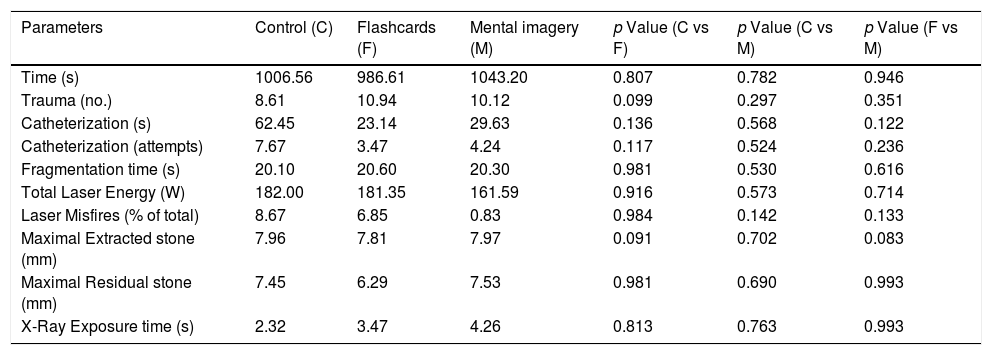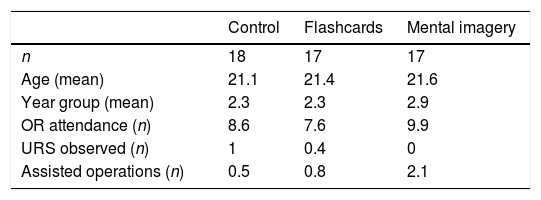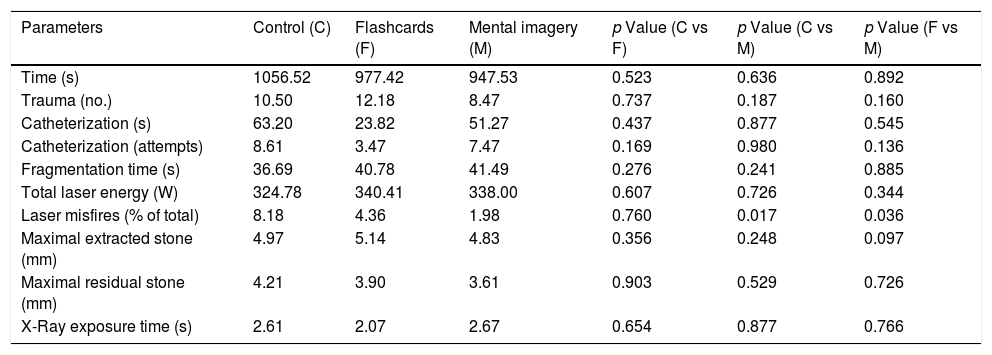Cognitive training is an important training modality which allows the user to rehearse a procedure without physically carrying it out. This has led to recent interests to incorporate cognitive training within surgical education but research is currently limited. The use of cognitive training in surgery is not clear-cut and so this study aimed to determine whether, relative to a control condition, the use of cognitive training improves technical surgical skills on a ureteroscopy simulator, and if so whether one cognitive training method is superior.
MethodsThis prospective, comparative study recruited 59 medical students and randomized them to one of three groups: control- simulation training only (n=20), flashcards cognitive training group (n=20) or mental imagery cognitive training group (n=19). All participants completed three tasks at baseline on the URO Mentor simulator followed by the cognitive intervention if randomized to receive it. Participants then returned to perform an assessment task on the simulator. Outcome measures from the URO Mentor performance report was used for analysis and a quantitative survey was given to all participants to assess usefulness of training received.
ResultsThis study showed cognitive training to have minimal effects on technical skills of participants. The mental imagery group had fewer laser misfires in the assessment task when compared to both control and flashcards group (p=0.017, p=0.036, respectively). The flashcards group rated their preparation to be most useful when compared to control (p=0.0125). Other parameters analyzed between the groups did not reach statistical significance. Cognitive training was found to be feasible and cost effective when carried out in addition to simulation training.
ConclusionThis study has shown that the role of cognitive training within acquisition of surgical skills is minimal and that no form of cognitive training was superior to another. Further research needs to be done to evaluate other ways of performing cognitive training.
La formación cognitiva es una modalidad de formación importante que permite al usuario ensayar un procedimiento sin realizarlo físicamente. Esto ha llevado a intereses recientes a incorporar la formación cognitiva en la educación quirúrgica, pero la investigación actualmente es limitada. El uso de la formación cognitiva en cirugía no es claro, por lo que este estudio tuvo como objetivo determinar si, en relación con una condición de control, el uso de la formación cognitiva mejora las habilidades quirúrgicas técnicas en un simulador de ureteroscopia y, si es así, si un método de formación cognitiva es superior.
MétodosEste estudio prospectivo y comparativo reclutó a 59 estudiantes de medicina y los asignó al azar a uno de los 3 grupos: formación de simulación de control solamente (n=20), grupo de formación cognitiva de tarjetas educativas (n=20) o grupo de formación cognitiva de imágenes mentales (n=19). Todos los participantes completaron 3 tareas al inicio en el simulador URO Mentor, seguidas de la intervención cognitiva si se asignaron al azar para recibirla. Los participantes regresaron para realizar una tarea de evaluación en el simulador. Las medidas de resultado del informe de ejecución URO Mentor se usaron para el análisis y se realizó una encuesta cuantitativa a todos los participantes para evaluar la utilidad de la formación recibida.
ResultadosEste estudio mostró que la formación cognitiva tiene efectos mínimos en las habilidades técnicas de los participantes. El grupo de imágenes mentales tuvo menos fallos de láser en la tarea de evaluación en comparación tanto con el grupo control como con el de tarjetas educativas (p=0,017, p=0,036, respectivamente). El grupo de tarjetas educativas calificó su preparación para ser más útil en comparación con el control (p=0,0125). Otros parámetros analizados entre los grupos no alcanzaron significación estadística. Se descubrió que la formación cognitiva era factible y rentable cuando se llevaba a cabo además de la formación de simulación.
ConclusiónEste estudio ha demostrado que el papel de la formación cognitiva en la adquisición de habilidades quirúrgicas es mínimo y que ninguna forma de entrenamiento cognitivo fue superior a otra. Se necesita investigar más para evaluar otras formas de realizar entrenamiento cognitivo.













